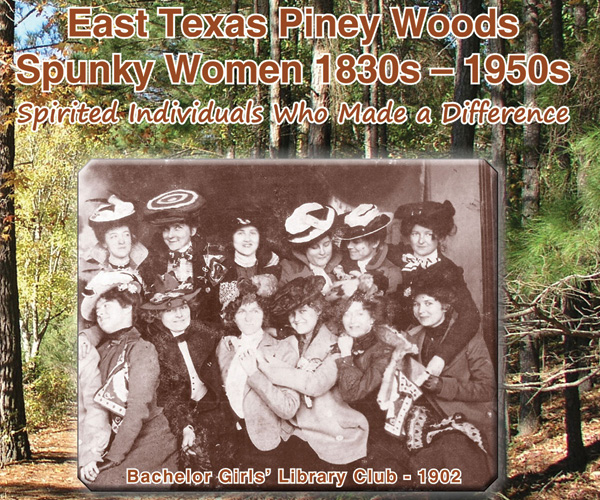Someone with more knowledge than most about the accomplishments and histories of local ladies in the Piney Woods is Cherokee County author and historian Deborah L. Burkett, who spent two and a half years learning about women whose stories intrigued her. The result was a 236-page book published in 2016 called East Texas Piney Woods Spunky Women, 1830s – 1950s, Spirited Individuals Who Made a Difference.
What they had in common, she notes, was an ability “to be strong in the face of adversity, to not give up and not be overwhelmed with sorrow and hardship, not to be knocked down by whatever comes your way but to do whatever it takes.” In other words, they had “spunk” in the face of tragedies and obstacles.
“They all pulled through,” she says. “They all had whatever it took to survive and to survive well.” Surprised by her findings, the author continues to interview spunky women for a storytelling podcast with Stephen F. Austin State University, and says she’s considering a Spunky Woman sequel to document stories of East Texas women of the last six decades.
Similarly, Carol C. Taylor of Greenville, a genealogist in Hunt County, and Vicki Betts, a reference librarian at UT Tyler who frequently works with the Smith County Historical Society, also speak fondly of the many East Texas women whose accomplishments through the years dramatically improved the lives of those around them and of generations to come.
Both researchers note that many of the important women in the region devoted their energies to the betterment of their local communities in fundamental ways with school and nonprofit involvements, providing their towns with a backbone of organized culture, enrichment, literacy and charitable giving programs.
“People often think of commerce when they look for the community leaders,” Taylor says, “but we have endless stories of women who impacted the lives of those around them in other really important ways.” They were out there, pushing for programs to expose others to art, music and theater and making sure young children had access to books, or addressing feeding problems in their towns. They were in clubs and running charities that made a world of difference in families’ lives.”


